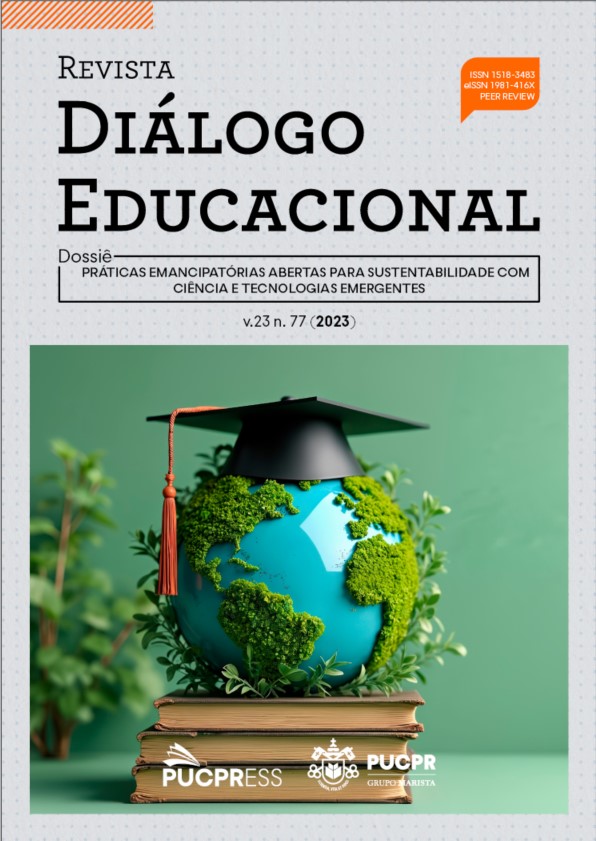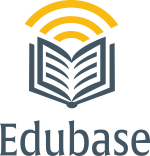Articulated experience between Design and Education in the Experimental Design Laboratory on wheels in Cruzeiro/SP
DOI:
https://doi.org/10.7213/1981-416X.23.077.DS04Abstract
The paper examines the educational quality of an extension Project in order to develop emancipatory training actions for students based on the methodology of design thinking and developed in formal and non-formal education contexts, considering UNESCO's Sustainable Development Goals (SDGs) targets and open schooling. Its activities are based on the challenge of creating innovative ideas for local problems in regions with contexts of technological, educational, social, cultural and economic inequalities, which include learners, experts and community. In the first edition of Experimental Design Laboratory (in Portuguese Laboratório Experimental de Design – LEDE), a total of 100 high school, vocational and technological students from the city of Cruzeiro - SP participated in face to face workshops, while 10 students from the Technology in Educational Design undergraduate course of Unifesp concomitantly participated in the proposal inserted in a discipline of their course. The analysis of this report is qualitative in nature and developed through action research. The observations presented in this document highlight that the methodology of design thinking applied in a context of challenge for local problem’s creation of solutions, as well as the complementary educational actions in the metaverses, in environments prepared for action (design laboratory/SpatialChat) with integration between groups formed by different origins, spaces and technological means, brought positive impacts by demonstrating the capacity of the groups to develop solutions, deal with diversity of thought and value otherness in the learning process. he article, based on the analysis of the manifestation of this educational approach in the students, proposes recommendations to higher education teacher-researchers and socio-cultural and educational agents locally impacted by the project for the use of the methodology of design thinking in the scope of emancipatory education supported by Open Schooling.
Downloads
References
AFLATOONY, L. WAKKARY, R. Thoughtful Thinkers: Secondary Schoolers’ Learning about Design Thinking. Vancouver, Canadá: Simon Fraser University, 2015. Disponível em: https://summit.sfu.ca/item/15249.
BARAN, P. On Distributed Communications: I. Introduction to Distributed Communications Networks. Santa Monica, CA: RAND Corporation, 1964. https://www.rand.org/pubs/research_memoranda/RM3420.html. Also available in print form.
BARDIN, L. Análise de conteúdo. SP: Edições 70, 2011.
BARDIN, L. L’Analyse de contenu. Paris: Presses Universitaires de France, 1977.
BUCHANAN, R. Wicked Problems in Design Thinking. Design Issues, v. 8, n. 2, pp. 5-21, Published by: The MIT Press, Spring, 1992.
BROWN, T. Design Thinking: Uma metodologia poderosa para decretar o fim das velhas ideias. Rio de Janeiro, RJ: Alta Books, 2017.
BROWN, T. Design Thinking: Thinking like a designer can transform the way you develop products, services, processes—and even strategy. Boston, EUA: Harvard Business Review, 2008. Disponível em:https://readings.design/PDF/Tim%20Brown,%20Design%20Thinking.pdf.
CRESWELL, J. W. Investigação qualitativa e projeto de pesquisa: escolhendo entre cinco abordagens. 3ª Ed. Porto Alegre: Penso, 2014.
CROSS, N.; DORST, K.; ROOZENBURG, N. Proceedings of a Workshop meeting held at the Faculty of Industrial Design Engineering, Delft University of Technology, The Netherlands, May 29-31, 1991. Delft: Delft University Press, 1991. Disponível em: https://repository.tudelft.nl/islandora/object/uuid:83a0d981-d053-4944-90af-3d165b9d079e?collection=research.
CROSS, N. Design Research: A Disciplined Conversation, Design Issues, v. 15 n. 1, pp. 5‐10, 1999. Disponível em: https://www.jstor.org/stable/1511837.
CROSS, N. Designerly ways of knowing: design discipline versus design science. Design Issues, v. 17, n. 3 pp. 49-55, 2001. Disponível em: http://oro.open.ac.uk/3281/.
DESIGN COUNCIL. Making life better by design. London, UK: Design Council, 2020. disponível em https://www.designcouncil.org.uk/our-work/our-impact/
EUROPEAN COMMISSION (EC). Open schooling and collaboration on science education, 2021. Disponível em: https://cordis.europa.eu/programme/id/H2020_SwafS-01-2018-2019-2020.
FARIA, A.; MEISTER, I.; LIMA, V. S. Plano de Trabalho LEDE | Laboratório Experimental de Design sobre Rodas UAB | Unifesp. Unifesp: São Paulo, 2021.
FREIRE, P. Pedagogia da autonomia: saberes necessários à prática educativa. São Paulo: Paz e Terra, 1996. (Coleção Leitura).
FURTADO, J. P. A avaliação participativa. In: OTERO, M. R. (org.). Contexto e prática da avaliação de iniciativas sociais no Brasil: temas atuais. São Paulo: Peirópolis, 2012, pp. 21-41.
GRUNSPAN, D. Z.; WIGGINS, B. L.; GOODREAU, S. M. Understanding Classrooms through Social Network Analysis:
A Primer for Social Network Analysis in Education Research. The American Society for Cell Biology - CBE—Life Sciences Education, v. 13, n. 2, pp. 167-178, 2017. Disponível em: https://www.lifescied.org/doi/10.1187/cbe.13-08-0162.
AÇÃO EDUCATIVA; UNICEF; PNUD; INEP-MEC (Coords.). Indicadores de qualidade na educação. São Paulo: Ação Educativa, 2004.
KELLEY, T. Confiança Criativa – libere sua criatividade e implemente suas ideias. São Paulo: HSM Brasil, 2014.
LIBÂNEO, J. C. Pedagogia e Pedagogos: para quê? São Paulo: Cortez, 2002.
MARTINS, G. A. Estudo de Caso: Uma estratégia de pesquisa. 2a ed. São Paulo: Atlas, 2008.
MEISTER, I.; OKADA, A. The knowledge in virtual networks with social media to promote open education: habitat of collective intelligences. EmRede Journal of Distance Education, v. 8, n. 2, 2021. Disponível em: https://www.aunirede.org.br/revista/index.php/emrede/article/view/799.
MINAYO, M. C. S. O desafio do conhecimento: pesquisa qualitativa em saúde. 7ª ed. São Paulo: Hucitec, 2000.
OKADA, A.; GRAY, P. A Climate Change and Sustainability Education Movement: Networks, Open Schooling, and the ‘CARE-KNOW-DO’ Framework. Sustainability v. 15, n. 3, 2356, 2023. Disponível em: https://doi.org/10.3390/su15032356.
OKADA, A.; RODRIGUES, E. A Educação Aberta com Ciência Aberta e Escolarização Aberta para Pesquisa e Inovação Responsáveis, p. 41 -54. In: TEIXEIRA, C. S.; SOUZA, M. de V. Educação Fora da Caixa: Tendências Internacionais e Perspectivas sobre a Inovação na Educação. São Paulo: Blucher, 2018.
OSTERWALDER, A. et al. Value Proposition Design – como construir propostas de valor inovadoras. Rio de Janeiro: HSM Brasil, 2014.
PATTON, M. Q. Qualitative evaluation and research methods. 2ª ed. Thousand Oaks: Sage; 1990.
RUSMANN, A.; EJSING-DUUN, S. When design thinking goes to school: A literature review of design competences for the K-12 level. Int J Technol Des Educ, v. 32, p 2063-2091, 2022. DOI: https://doi.org/10.1007/s10798-021-09692-4. Disponível em: https://link.springer.com/article/10.1007/s10798-021-09692-4.
THIOLLENT, M. J.-M. Aspectos qualitativos da metodologia de pesquisa com objetivos de descrição, avaliação e reconstrução. Cad. Pesqui. [online], n. 49, pp. 45-50, 1984. ISSN 0100-1574.
Downloads
Published
How to Cite
Issue
Section
License
Copyright (c) 2023 Editora Universitária Champagnat

This work is licensed under a Creative Commons Attribution 4.0 International License.
O(s) autor(es) transfere(m), por meio de cessão, à EDITORA UNIVERSITÁRIA CHAMPAGNAT, pessoa jurídica de direito privado, inscrita no CNPJ/MF sob o n.º 76.659.820/0009-09, estabelecida na Rua Imaculada Conceição, n.º 1155, Prado Velho, CEP 80.215-901, na cidade de Curitiba/PR, os direitos abaixo especificados e se compromete a cumprir o que segue:
- Os autores afirmam que a obra/material é de sua autoria e assumem integral responsabilidade diante de terceiros, quer de natureza moral ou patrimonial, em razão de seu conteúdo, declarando, desde já, que a obra/material a ser entregue é original e não infringe quaisquer direitos de propriedade intelectual de terceiros.
- Os autores concordam em ceder de forma plena, total e definitiva os direitos patrimoniais da obra/material à EDITORA UNIVERSITÁRIA CHAMPAGNAT, a título gratuito e em caráter de exclusividade.
- A CESSIONÁRIA empregará a obra/material da forma como melhor lhe convier, de forma impressa e/ou on line, inclusive no site do periódico da EDITORA UNIVERSITÁRIA CHAMPAGNAT, podendo utilizar, fruir e dispor do mesmo, no todo ou em parte, para:
- Autorizar sua utilização por terceiros, como parte integrante de outras obras.
- Editar, gravar e imprimir, quantas vezes forem necessárias.
- Reproduzir em quantidades que julgar necessária, de forma tangível e intangível.
- Adaptar, modificar, condensar, resumir, reduzir, compilar, ampliar, alterar, mixar com outros conteúdos, incluir imagens, gráficos, objetos digitais, infográficos e hyperlinks, ilustrar, diagramar, fracionar, atualizar e realizar quaisquer outras transformações, sendo necessária a participação ou autorização expressa dos autores.
- Traduzir para qualquer idioma.
- Incluir em fonograma ou produção audiovisual.
- Distribuir.
- Distribuir mediante cabo, fibra ótica, satélite, ondas ou qualquer outro sistema que permite ao usuário realizar a seleção da obra ou produção para recebê-la em tempo e lugar previamente determinados por quem formula a demanda e nos casos em que o acesso às obras ou produções se faça por qualquer sistema que importe em pagamento pelo usuário.
- Incluir e armazenar em banco de dados, físico, digital ou virtual, inclusive nuvem.
- Comunicar direta e/ou indiretamente ao público.
- Incluir em base de dados, arquivar em formato impresso, armazenar em computador, inclusive em sistema de nuvem, microfilmar e as demais formas de arquivamento do gênero;
- Comercializar, divulgar, veicular, publicar etc.
- Quaisquer outras modalidades de utilização existentes ou que venham a ser inventadas.
- Os autores concordam em conceder a cessão dos direitos da primeira publicação (ineditismo) à revista, licenciada sob a CREATIVE COMMONS ATTRIBUTION LICENSE, que permite o compartilhamento do trabalho com reconhecimento da autoria.
- Os autores autorizam a reprodução e a citação de seu trabalho em repositórios institucionais, página pessoal, trabalhos científicos, dentre outros, desde que a fonte seja citada.
- A presente cessão é válida para todo o território nacional e para o exterior.
- Este termo entra em vigor na data de sua assinatura e é firmado pelas partes em caráter irrevogável e irretratável, obrigando definitivamente as partes e seus sucessores a qualquer título.
- O não aceite do artigo, pela EDITORA UNIVERSITÁRIA CHAMPAGNAT, tornará automaticamente sem efeito a presente declaração.













